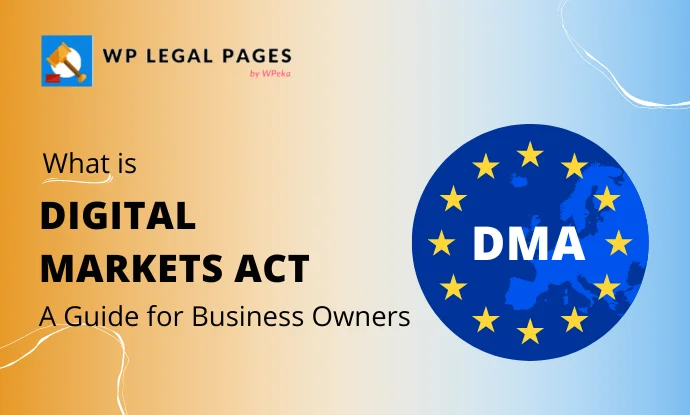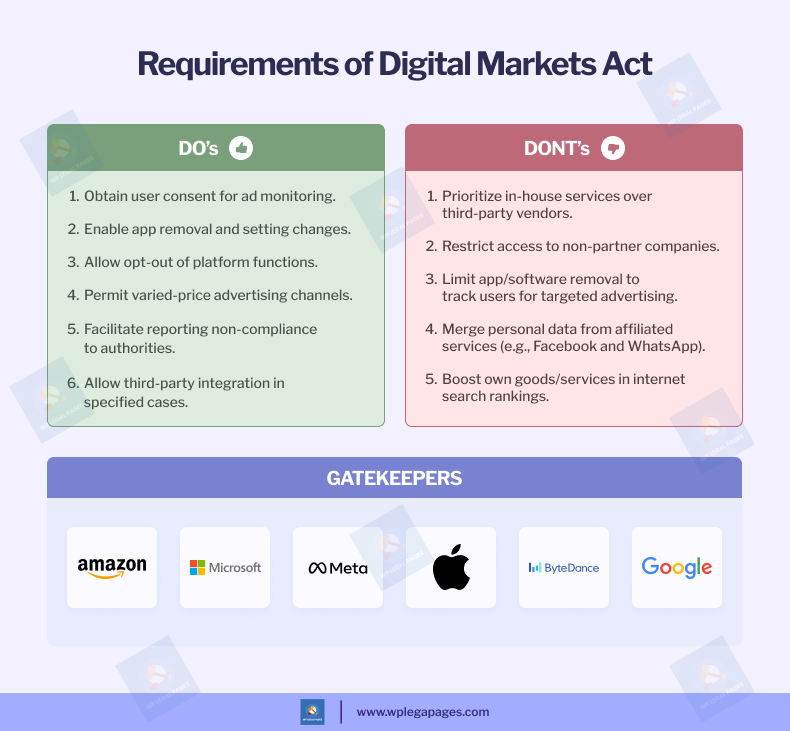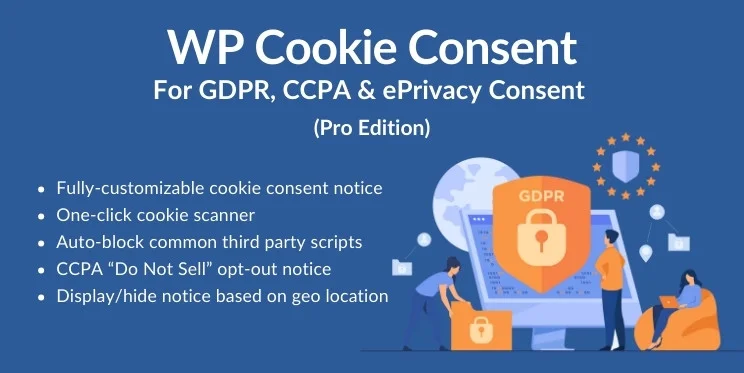Digital Markets Act: What Website Owners Need to Know In 2024

Are you wondering about what the Digital Markets Act is?
Digital Markets Act is a regulation by the European Union that aims to regulate large online platforms by making digital platforms safer. In addition, the Digital Market Act aims to safeguard the data privacy of users online.
Due to the unregulated digital space, the EU Digital Markets Act has come into effect. It came into force on 1 November 2022 and became applicable on 2 May 2023.
In this article, we’ll talk about the Digital Markets Act—what it is, who it affects, and how it changes the way internet businesses operate.
- What Is The EU Digital Markets Act (DMA)?
- Who Does EU DMA Apply To?
- What Are The Requirements of The Digital Markets Act?
- Fines and Penalties Under the Digital Markets Act 2022
- Timeline of DMA
- What Does The DMA Mean For Your Business?
- Checklist For European Union’s Digital Markets Act Compliance
- FAQ
- Conclusion
What Is The EU Digital Markets Act (DMA)?
The Digital Markets Act (DMA) was created by the European Union to regulate the practices of large online platforms in the European digital markets. It came into effect on 1st November 2022 and became effective on 2nd May 2023.
The Digital Markets Act is centered around six large tech companies currently controlling the digital world. According to the Digital Markets Act European Commission, these six large tech companies are known as gatekeepers.
Under the Digital Markets Act, Alphabet (parent company of Google and Android), Amazon, Apple, ByteDance(parent company of TikTok), Meta (parent company of Facebook, Instagram and WhatsApp), and Microsoft (parent company of LinkedIn) have been named gatekeepers by the European Commission.
Ensuring fair competition is the primary goal of the Digital Markets Act 2022, which prevents large tech companies from controlling the industry and allows new competitors to enter.
While these six giant gatekeepers are tickling down the businesses of small website owners, these large companies chosen by the Digital Market Act European Commission have time until 6 March 2024 to comply with DMA Obligation.
Who Does EU DMA Apply To?
Not all companies are subject to the DMA’s regulations. Only businesses that the Digital Market Act European Commission designates as gatekeepers are required to abide by its rules.
DMA applies to businesses and platforms that have an excessive impact on the digital economy. For example, platforms that:
- Have considerable market reach, economic power, and durability over several years.
- Serve as an essential connection for potential clients and businesses.
- Take pleasure in a firmly established position that is hard to overcome
Any business operating in the European Union that satisfies all three of these requirements is required to notify the European Commission within two months, after which it will proceed through the formal gatekeeper designation procedure.
To Qualify As a DMA Gatekeeper, Companies Must:
- Have a market capitalization of €75 billion in the most recent fiscal year or an annual turnover of €7.5 billion or more in the European Economic Area (EEA) for each of the previous three fiscal years, or a market capitalization of €75 billion in the last financial year.
- Organizations have 10,000+ annual active business users in the EU and over 45 million EU end users.
- Businesses that have fulfilled the second requirement for at least three fiscal years in a row.
The European Union (EU) identified six large tech companies as gatekeepers for the Digital Markets Act (DMA) in September 2022. The DMA gives these businesses the ability to achieve full compliance for all their primary digital services within six months of being designated.
To prevent misuse of the gatekeeper role, the DMA categorizes its main platform services, which include social media, operating systems, cloud infrastructure, and search engines, and enforces regulations.
Once designated as gatekeepers, companies have six months to fulfill their gatekeeper responsibilities before facing penalties.
What Are The Requirements of The Digital Markets Act?

The Digital Markets Act requires gatekeepers to comply with the following requirements in order to fix the current imbalances caused by them.
- Get user consent before being monitored for advertising purposes.
- Permit users to remove any apps and modify their default settings.
- Permit users to discontinue using specific platform functions.
- Even if the pricing differs from what is provided through the gatekeeper, gatekeepers must permit companies to advertise their goods or services via direct channels or through third-party internet services.
- Gatekeepers must allow end users and business users to report non-compliance issues to the appropriate legal authorities.
- Allow third-party access to integrate with the gatekeeper’s services in certain situations.
Furthermore, gatekeepers are not allowed to use certain unfair strategies. For example, gatekeepers are not allowed to:
- Prioritize their services over similar services provided by third-party vendors.
- Prevent customers from visiting companies that are not on their platforms.
- Stop users from removing installed apps or software, even if they want to track end users for targeted advertising without permission.
- Combine personal information from many services that are owned by the same business, such as Facebook and WhatsApp.
- Rank their own goods or services higher in internet searches than rivals.
Failure to comply with the above-mentioned requirements can result in gatekeepers in severe penalties.
Fines and Penalties Under the Digital Markets Act 2022
Severe penalties for breaking the DMA are outlined in Articles 29-30 and can amount to up to 10% of a company’s global sales for first-time violators and up to 20% for repeat offenders if it repeats within 8 years.
In addition, companies can be subject to recurrent fines of up to 5% of their daily average turnover.
If gatekeepers fail to comply with obligations related to accurate information submission, data access provision, and many more, they can be fined up to 1% of their total worldwide turnover from the previous financial year.
Timeline of DMA
Significant milestones on the DMA schedule stretch into the future. The gatekeepers will have until March 6, 2024, six months from the date of their designation, to fulfill the new requirements.
What Does The DMA Mean For Your Business?

Although small websites and applications won’t be directly subject to DMA requirements. Digital Markets Act aims to improve innovation and fairness in the digital world.
It is crucial to get consent before collecting or using personal data via these gatekeeper platforms or services and to let the gatekeeper know accordingly.
As a website owner, you must be able to log that the EU users have obtained consent to process their personal data.
You can get consent for the use of cookies and to access personal data by using a consent management platform such as WP Cookie Consent.
This plugin will not only help you to comply with the rules and regulations of the EU but will also help you to enable consent logging.
In addition, the WP Cookie Consent plugin can help you with consent forwarding- if you have multiple WordPress sites for one organization, you can get user consent on one site, and it will count for selected sites in the network.
Checklist For European Union’s Digital Markets Act Compliance
The Digital Markets Act (DMA) is transforming the digital world by focusing on large online platforms known as “gatekeepers” with extensive reach throughout the European Economic Area.
Here is a short checklist to help you make sure your website complies with DMA regulations:
- Use good tools for consent and privacy management
- Carefully handle user data
- Keep clear and up-to-date privacy policies
- Ask consumers for explicit consent before collecting or using their personal information.
- Send consent signals to gatekeeper services (like Google Consent Mode) that you integrate with.
- Give business users access to their data in accordance with DMA guidelines.
- Ensure that gatekeeper platforms and services are in compliance with laws. Stay informed about any updates or modifications to the gatekeeper’s policies.
FAQ
The Digital Markets Act is a regulation introduced by the European Union with the aim to provide secure online platforms for operators within the EU. The DMA was enforced in November 2022, and some of its benefits include promoting a healthier and fairer digital market, improving transparency, and creating more innovative opportunities.
There are 6 gatekeepers of the Digital Market Act that the European Commission has designated they are – Alphabet (parent company of Google and Android), Amazon, Apple, ByteDance(parent company of TikTok), Meta (parent company of Facebook, Instagram, and WhatsApp), and Microsoft (parent company of LinkedIn).
The European Commission has classified certain large online platforms as gatekeepers to which the Digital Markets Act applies.
The Digital Services Act is a law that covers social networking platforms, e-commerce marketplaces, and other digital services. It emphasizes user rights, openness, and safety.
The DMA aims to regulate major gatekeeper platforms such as Apple, Google, and others. It seeks to promote fair digital marketplaces and prevent anti-competitive actions by these businesses.
Conclusion
The Digital Markets Act is a European regulation that will have a global impact on organizations. This groundbreaking legislation is the first of its kind to regulate the Internet marketplace, which has rapidly expanded in recent years.
It may even inspire other nations to enforce similar laws. Due to this regulation, big tech companies’ online operations are likely to change, affecting various online platforms.
Using a DMA-supporting Cookie management platform like WP Cookie Consent will ensure to comply with the cookies set by the gatekeeper service platform.
If you’ve liked reading this article, check out our other engaging articles as well:
- Uncover Cookie Analytics: What Are Analytical Cookies?
- What Are Session Cookies? – An Ultimate Guide for 2024
- Understanding Privacy Statements and Simplifying Compliance
Do you want to comply with DMA law? Grab WP Cookie Consent tool now.